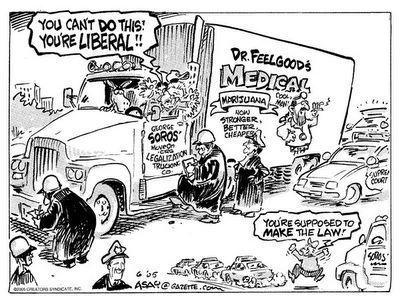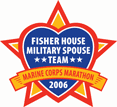For Those Who Spaced Out on the Ruling Today ...
For the first time in what seems like an eternity for conservatives, the Supreme Court of the United States delivered a verdict that was actually consistent with the values and principles on which this country was founded on. In the case concerning the use of medical marijuana by patient and prescribed by their doctors to counter the effects of nausea and discomfort caused by certain injuries or diseases, the Supreme Court refused to sanction the use of marijuana for medical purposes, dashing the hopes of thousands of US patients illicitly using the banned substance for pain relief.
If you search the Supreme Court Wire on Yahoo’s search engine and examine the photos taken by Reuters examining several patients who use medical marijuana, you will have an even better understanding as to why this decision handed down was the right one. One patient, a man by the name of Christopher Campbell, says he will defy the order of the Court and continue using the ‘medical’ marijuana to quell the pain caused by his cancer. Be prepared to go to jail then, Mr. Campbell. But here’s a question, if the ‘medical’ marijuana only assists in dulling the pain caused by the cancer but does nothing to eradicate from your body, what use is it then?
Angel Raich, along with Diane Monson, sued former Attorney General John Ashcroft to not only obtain a court order which would allow patients to obtain ‘medical’ marijuana but also to grow it in their backyards for their own use. Are these women insane? I don’t know them personally so I can not say what their true intentions are for the use of ‘medical’ marijuana that they are allowed to grow in their own backyards other then to counter discomfort or pain caused by a disease but I can say for sure that not everyone who is prescribed ‘medical’ marijuana needs it and will take advantage of the state laws in order to bypass the feds.
The benefit of being the son of a father who is pharmacist and a mother who is a nurse is that you are able to obtain crucial information concerning the practice and use of medicine easily and quickly without having to spend countless hours searching through websites on the internet and determining which ones are legitimate for publication. Patients who use ‘medical’ marijuana assure others that they need it in order to counter the effects of nausea. The problem is that a drug similar to the smoked variety of marijuana already exists. It is called Marinol.
The U.S. Drug Enforcement Administration has set up a website with information concentrated on discerning the myths surrounding the use of ‘medical’ marijuana and why Marinol is a better option for patients in the United States. Here is just a small sampling of what the site provides …
- There are no FDA-approved medications that are smoked. For one thing, smoking is generally a poor way to deliver medicine. It is difficult to administer safe, regulated dosages of medicines in smoked form. Secondly, the harmful chemicals and carcinogens that are byproducts of smoking create entirely new health problems. There are four times the level of tar in a marijuana cigarette, for example, than in a tobacco cigarette.
- A pharmaceutical product, Marinol, is widely available through prescription. It comes in the form of a pill and is also being studied by researchers for suitability via other delivery methods, such as an inhaler or patch. The active ingredient of Marinol is synthetic THC, which has been found to relieve the nausea and vomiting associated with chemotherapy for cancer patients and to assist with loss of appetite with AIDS patients.
- Unlike smoked marijuana--which contains more than 400 different chemicals, including most of the hazardous chemicals found in tobacco smoke-Marinol has been studied and approved by the medical community and the Food and Drug Administration (FDA), the nation's watchdog over unsafe and harmful food and drug products. Since the passage of the 1906 Pure Food and Drug Act, any drug that is marketed in the United States must undergo rigorous scientific testing. The approval process mandated by this act ensures that claims of safety and therapeutic value are supported by clinical evidence and keeps unsafe, ineffective and dangerous drugs off the market.



























































<< Home